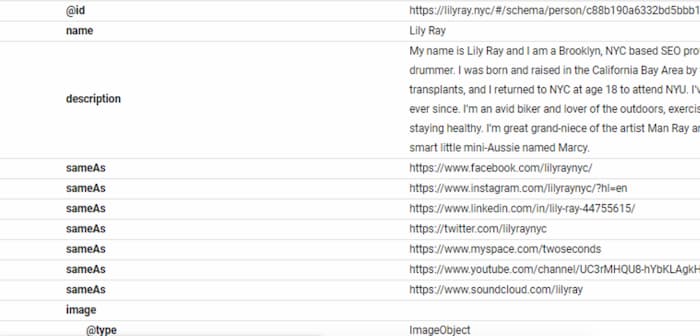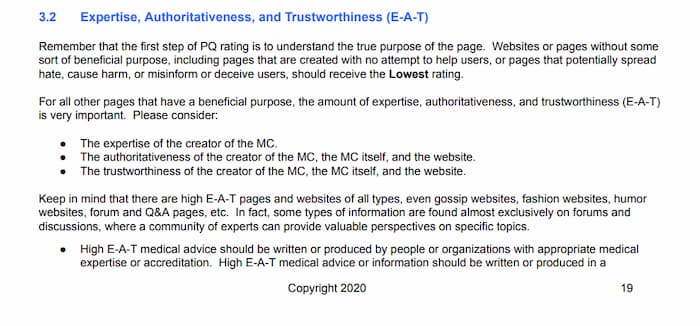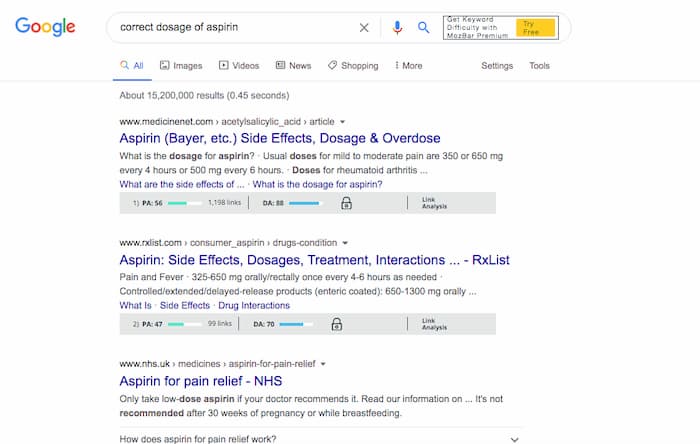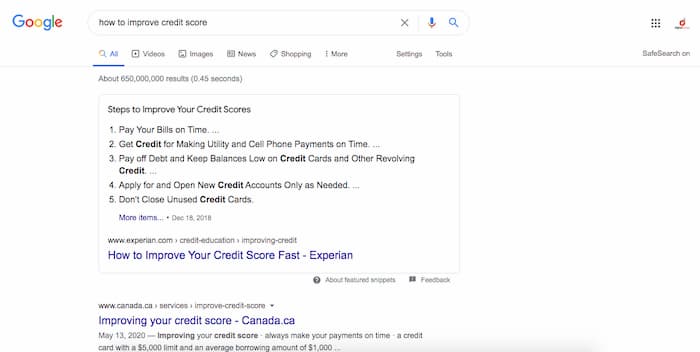
Search engines display web pages based on multiple ranking factors and specific set criteria defined within its algorithm which changes with every query. The underlying criteria for assessing quality is based on the Search Quality Evaluator Guidelines that was published in 2013. The guide defines the principles behind the Google E.A.T. algorithm which continues to play a more integral part in Google’s ranking system.
Table of Contents
ToggleWhat is E.A.T. in SEO?
E.A.T. is an acronym that stands for Expertise, Authority and Trust. A page that can demonstrate these qualities at a high level is considered to be of high quality. Understanding how to demonstrate these qualities to Google and other search engines can improve your website’s search visibility.
Expertise
This aspect refers to the author’s experience or credentials and how it contributes to their expertise on the topic being published. Expertise can be defined as awards, occupation, experience or accomplishments that are relevant to the topic of the main content.
Authority
The authoritativeness refers to how recognized the website or author is in their field. Do others mention them in the same niche? Are they well-known within their industry and considered to demonstrate thought leadership?
Trust
How well can the website be trusted? Does the website provide security for safe browsing or give a user the confidence to input personal information? Trust signal refers to the means for providing a user with security when browsing the website or interacting with the website.
These three attributes of a web page combine to form the basic principles of E.A.T. and the foundation of assessing the quality of a page.
Why is E.A.T. important?
A search engine function is to display the best solution to a search query. It should come as no surprise that part of this function is to filter out low-quality results and only display high-quality results. To make your website displayed frequently for important search terms to your business, your website needs to communicate the E.A.T. principles where they are most appropriate.
As search engines become better at applying the many different variables that make up a quality web page, the E.A.T. principles will have more impact on your website’s search visibility. Improving these attributes will contribute to higher rankings from increased traffic generation and ultimately increased streams of revenue.
Who does E.A.T. affect?
Technically, the E.A.T. principles affect every website, although it plays a much bigger role in the search visibility of some website over others.
Website’s with subjective content
For example, if a query is made on worlds cutest pets, E.A.T. won’t play as big a role in the search algorithm because the topic is fairly subjective. There isn’t as great a demand placed on a website to prove expertise, authority or trust when providing subjective or entertaining content compared to something that could impact a person’s life.
Does E.A.T. still, play a role in search visibility for subjective content? The short answer is yes. There is still the matter of providing a safe browsing experience and even backlinks that will affect ranking (trust and authority). In this example, however, expertise isn’t really a factor as much as the content itself and how users perceive its value.
Website’s with objective content
When a search is for a recommended dosage of a type of drug, then it becomes a more serious topic. The answer requires a specific level of expertise in order to be reliable and safe instructions for people to follow.
Search engines don’t want to display a search result that could potentially have false or misleading information that could potentially harm someone.
Websites that affect Your Money Your Life (YMYL websites)
Google rolled out the Medic Update in 2018 specifically to target websites that publish content with the potential to impact people’s lives seriously. These sites were referred to as YMYL websites (Your Money, Your Life). The result of the update was devastating for YMYL websites that did not demonstrate the E.A.T. principles.
Below is an example of a website that lost more than 50% of its traffic because it did not demonstrate the proper E.A.T. required for a blog that published health related content.
You can read more about how this website not only recovered its traffic but gained much more by applying the principles to match the Google E.A.T. algorithm.
YMYL websites publish content on topics such as health, finances and any information that affects the well-being of a person’s life. Articles that offer a recommended dosage-even with something as simple as aspirin is now a topic that can only be answered by a doctor.
Here is a search result for the phrase correct dosage of aspirin in which not a single website is listed that doesn’t demonstrate high levels of expertise and authority.
Offering a solution on how to reduce your debt or improve your credit is another topic that should only be published by a professional. Misleading information published on this content could potentially cripple a person financially. The Medic Update now requires searches regarding financial advice to be backed by experts and professionals.
The principles of E.A.T. affect all websites, although there are different degrees in which it affects a websites search visibility
How is E.A.T. applied to ranking?
The Search Quality Evaluation Guidelines outline the specifics on how the quality of a web page is determined. This guide provides a basic structure for what is required to meet the needs of the user and offers examples of web pages in different niches that demonstrate high E.A.T.
The problem
Although E.A.T. has been around since 2013, Google and other search engines struggled with a way of applying these principles within their algorithm. Many of these concepts are fundamentally human making it difficult to create an algorithm that could accurately assess content by applying the same concepts.
The solution
Google’s solution was to create many smaller algorithms tailored to specific niches that could identify the specifics of what was deemed quality.
Once the engineers have a potential change they want to implement, they will show the results to a team of quality raters both with and without the changes to the algorithm. The team is not informed on which set of search results is from the new algorithm.
The raters will then provide positive or negative feedback on the new algorithm search results. If the reviews were positive from the new tweak to the algorithm, Google will implement the change.
How do you improve the E.A.T. of your website?
Keep in mind that every niche may have a different set of values that impact ranking more than another. There are a set of guidelines that are outlined clearly in the search quality evaluator guidelines.
The key to understanding what’s most important is to think of the user first and what would make their experience better. Here are a few of the general practices that will contribute to a higher E.A.T. rating for your website.
Communicate expertise
If your website deals with YMYL content, there is no option but to prove what credentials and expertise the author of the content has in their field.
Publish a detailed About page
For example, if you are the only author on your website that deals with medical advice, you will need to have a strong About page that states your qualifications.
Tell users and search engines why you’re qualified to write about the content you’re publishing by stating your degrees, years in the industry, name of your practice.
List your achievements, awards and notable accomplishments or acknowledgements by other credible sources. Publishing these types of details signals to search engines that you have the expertise required to publish this type of information.
The same holds true for other websites in every niche. The example used in the Quality Search Guidelines uses the About page from a fish and chips restaurant as an example of a small business web page showing high E.A.T.
Hire experts or invite guest authors
Best practice to get the most E.A.T. would be to hire experts whenever possible. Have professionals publish content on topics they are qualified to write about. This provides credibility to the content as well as your website.
Provide author bios
Include a section to communicate the expertise of your author. This is the area that you can show users and search engines that your content is written by a professional and boost the E.A.T. signals of your website.
Build authority with high quality backlinks and mentions
Authoritativeness is mostly measured by the quality of backlinks and mentions of your website. This has always been a major ranking factor-since the beginning of Google. This concept is more easily understood through the “voting” analogy.
Aim for a high number of votes of credibility
A backlink or mention of your website by other quality websites are votes of confidence. When you accumulate a high number of votes (compared to your competitors) you’re considered an authority in your niche.
Target websites that are considered high authority
The only difference in this analogy is that unlike the concept of voting some votes count for more than others. Improving the backlink profile of your website creates authority. Strive to acquire quality backlinks from websites that are credible and have authority themselves.
Google is more efficient at determining a quality backlink now more than ever. This is and will be a main ranking factor far into the foreseeable future.
Inspire trust
You can improve the trust signals of your website by creating a safe and reliable user experience. The level of trust that you need to demonstrate depends on the type of industry you’re in.
Provide basic trust signals
For example, if you’re in ecommerce, it goes without saying that if your site doesn’t have the basics like an SSL certificate, you’ve already lost an easy trust signal.
Providing secure methods of payment such as using safe and trusted companies like PayPal or Moneris is also another way to make users feel secure with entering payment information while on your website.
Publish detailed contact pages
The contact information your website displays is also considered a way of inspiring trust. When a user is considering a product or service, your accessibility and customer service may play a role in their purchase decision.
A website that has an email address and a contact form does not inspire trust, compared to a dedicated customer service line available 24/7. This would be important for products or services where people need to feel more secure about the type of assistance they’ll get if something goes wrong.
If customer service is a major component to your product or service, providing adequate and detailed contact information will improve the trust signals of your website.
Add structured data markup
Use structured data markup to implement Schema and communicate to search engines any information you want to be highlighted. The added markup contributes to the knowledge graph and connects your website to other web properties/entities to provide additional trust signals.

Structure your site for users
Link to your about and contact pages from the navigation bar or footer of your website to make these pages easily found. Structure your website in a way that users can find everything they need to build confidence in your brand.
What’s good for users is also good for search engines. They are and forever will be linked. Websites that provide a high level of user experience are rewarded with high search engine rankings.
At the end of the day, search engines want what’s best for the user. If you can identify what those things are in your niche, you’re able to apply the most accurate principles that satisfy the Google EAT algorithm and positively impact your search visibility.







